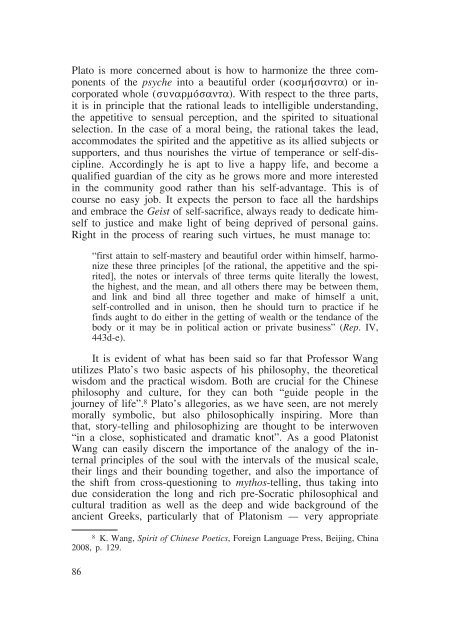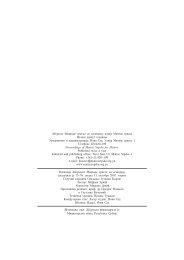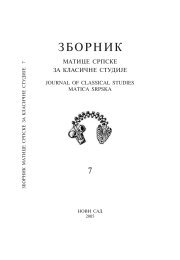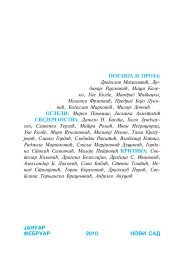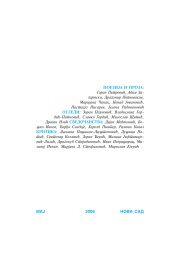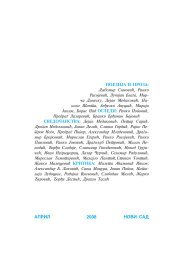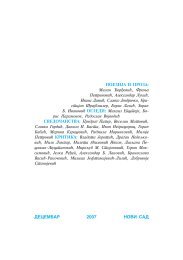Create successful ePaper yourself
Turn your PDF publications into a flip-book with our unique Google optimized e-Paper software.
Plato is more concerned about is how to harmonize the three components<br />
of the psyche into a beautiful order (kosm0santa) orincorporated<br />
whole (synarmÃsanta). With respect to the three parts,<br />
it is in principle that the rational leads to intelligible understanding,<br />
the appetitive to sensual perception, and the spirited to situational<br />
selection. In the case of a moral being, the rational takes the lead,<br />
accommodates the spirited and the appetitive as its allied subjects or<br />
supporters, and thus nourishes the virtue of temperance or self-discipline.<br />
Accordingly he is apt to live a happy life, and become a<br />
qualified guardian of the city as he grows more and more interested<br />
in the community good rather than his self-advantage. This is of<br />
course no easy job. It expects the person to face all the hardships<br />
and embrace the Geist of self-sacrifice, always ready to dedicate himself<br />
to justice and make light of being deprived of personal gains.<br />
Right in the process of rearing such virtues, he must manage to:<br />
“first attain to self-mastery and beautiful order within himself, harmonize<br />
these three principles [of the rational, the appetitive and the spirited],<br />
the notes or intervals of three terms quite literally the lowest,<br />
the highest, and the mean, and all others there may be between them,<br />
and link and bind all three together and make of himself a unit,<br />
self-controlled and in unison, then he should turn to practice if he<br />
finds aught to do either in the getting of wealth or the tendance of the<br />
body or it may be in political action or private business" (Rep. IV,<br />
443d-e).<br />
It is evident of what has been said so far that Professor Wang<br />
utilizes Plato's two basic aspects of his philosophy, the theoretical<br />
wisdom and the practical wisdom. Both are crucial for the Chinese<br />
philosophy and culture, for they can both “guide people in the<br />
journey of life". 8 Plato's allegories, as we have seen, are not merely<br />
morally symbolic, but also philosophically inspiring. More than<br />
that, story-telling and philosophizing are thought to be interwoven<br />
“in a close, sophisticated and dramatic knot". As a good Platonist<br />
Wang can easily discern the importance of the analogy of the internal<br />
principles of the soul with the intervals of the musical scale,<br />
their lings and their bounding together, and also the importance of<br />
the shift from cross-questioning to mythos-telling, thus taking into<br />
due consideration the long and rich pre-Socratic philosophical and<br />
cultural tradition as well as the deep and wide background of the<br />
ancient Greeks, particularly that of Platonism — very appropriate<br />
8 K. Wang, Spirit of Chinese Poetics, Foreign Language Press, Beijing, China<br />
2008, p. 129.<br />
86


